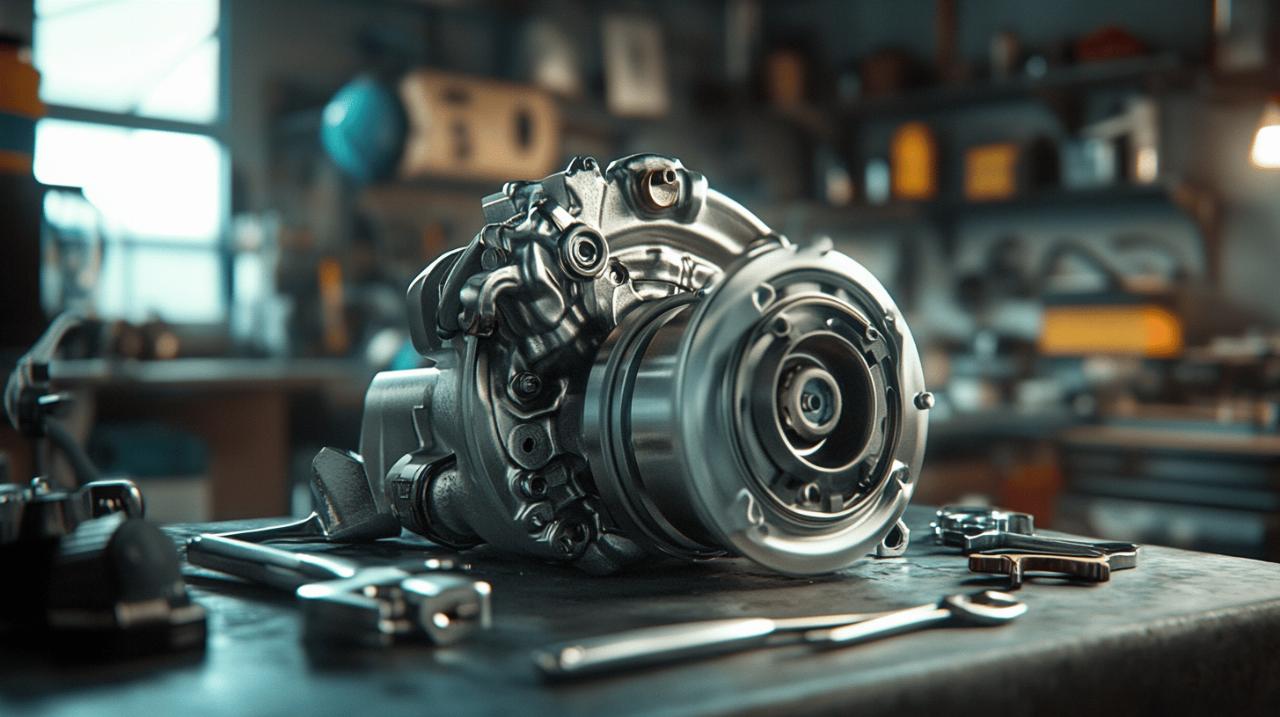Proper maintenance of your Peugeot 307’s turbocharger is essential for ensuring optimal performance and longevity of your vehicle. The turbocharger is a crucial component that boosts engine power while improving fuel efficiency, but it requires specific care to avoid costly repairs. This comprehensive guide will walk you through the necessary steps to keep your turbo running smoothly for years to come.
Understanding your Peugeot 307’s turbocharger
Before diving into maintenance specifics, it’s important to grasp how this vital component operates in your vehicle. A turbocharger essentially recycles exhaust gases to increase engine power without requiring a larger engine displacement. This ingenious system allows your modest-sized Peugeot engine to deliver impressive performance while maintaining reasonable fuel consumption. Many automotive enthusiasts using forums like those found at https://www.auto-h-aus-europa.de/ often discuss the technical aspects of turbocharger systems and share their maintenance experiences.
How turbochargers function in your Peugeot
The turbocharger in your Peugeot 307 works by harnessing exhaust gas energy to spin a turbine wheel at extremely high speeds, often exceeding 150,000 RPM. This turbine is connected to a compressor wheel that forces additional air into the combustion chambers, allowing more fuel to be burned and generating increased power. This process creates significant heat and stress on components, which is why proper maintenance is absolutely crucial for technical repairs to be kept to a minimum.
Signs of a healthy vs struggling turbocharger
A properly functioning turbocharger provides smooth acceleration without unusual noises or smoke. You should experience consistent power delivery throughout your drive without any sudden losses in performance. Conversely, a struggling turbo might exhibit whistling or whining sounds, excessive exhaust smoke, or a noticeable decrease in power, especially during acceleration. These symptoms warrant immediate attention from qualified mechanics with expertise in turbocharged systems to avoid further damage and potentially expensive repairs.
Essential oil maintenance for turbo longevity
The lifeblood of your turbocharger is proper lubrication. Due to the extreme operating conditions, maintaining clean, high-quality oil is perhaps the most critical aspect of turbo care. Unlike naturally aspirated engines, turbocharged engines place additional demands on oil performance, making oil maintenance even more important for your Peugeot 307.
Selecting the proper oil grade for your Peugeot 307
Your owner’s manual specifies the exact oil grade recommended for your particular model year and engine variant. Most Peugeot 307 turbocharged engines require fully synthetic oils with specific viscosity ratings and performance specifications. Using an incorrect oil grade can lead to insufficient lubrication at the high temperatures turbochargers operate at, potentially resulting in premature bearing wear or even complete turbo failure. When considering vehicle maintenance costs, investing in quality oil is relatively inexpensive compared to turbocharger replacement.
Establishing an effective oil change schedule
Turbocharged engines typically require more frequent oil changes than their naturally aspirated counterparts. While conventional wisdom might suggest changing oil every 10,000 miles, turbo engines benefit from shorter intervals of around 5,000-7,500 miles, depending on your driving conditions. Regular oil analysis can provide valuable insights into your engine’s health and help establish a personalised maintenance schedule. Fresh oil ensures proper lubrication of the turbo bearings, which operate under extreme conditions and are crucial for overall turbocharger performance and longevity.

Proper driving habits to protect your turbocharger
Your driving behaviour significantly impacts turbocharger lifespan. Certain practices can dramatically reduce wear and tear, while others might accelerate deterioration. Understanding these driving tips can save you from costly repairs and extend the service life of your turbo system.
The importance of warm-up and cool-down periods
Before demanding full power from your turbocharged Peugeot 307, allow the engine to reach proper operating temperature. This ensures oil flows adequately to all components, including the turbocharger bearings. Even more critical is the cool-down period after driving, especially following high-speed or uphill sections that place additional strain on the turbo. Allow your engine to idle for 30-60 seconds before switching off, giving the turbocharger time to slow down while still receiving oil circulation. This simple practice prevents oil coking and bearing damage that can occur when hot oil stagnates in a suddenly stopped turbo.
Avoiding practices that strain your turbo system
Certain driving behaviours place excessive stress on your turbocharger. Frequent short trips prevent the engine from reaching optimal operating temperature, leading to condensation and potential oil contamination. Aggressive acceleration from low RPM, known as lugging the engine, forces the turbo to spool up rapidly under high load, increasing wear. Similarly, consistently driving at maximum boost pressure without allowing recovery periods can lead to overheating. Adopting smoother driving techniques not only preserves your turbocharger but also improves overall fuel efficiency and reduces general wear across your vehicle’s drivetrain.
Air Filtration and Its Impact on Turbo Performance
The air filtration system plays a crucial role in protecting your turbocharger from harmful contaminants. Even tiny particles can cause significant damage when they enter the precision-engineered components of your turbo spinning at extremely high speeds. Regular inspection and maintenance of air filtration components is therefore essential for preserving turbocharger health.
Recognising when your air filter needs attention
Your Peugeot 307’s air filter should be inspected regularly as part of your routine vehicle maintenance schedule. Visual examination can reveal excessive dirt accumulation, oil contamination, or physical damage that compromises filtration efficiency. Performance indicators such as reduced acceleration, decreased fuel economy, or unusual engine sounds might also signal a clogged air filter. Most manufacturers recommend inspection every 15,000 miles, but dusty environments or frequent urban driving may necessitate more frequent checks to ensure optimal protection for your turbocharger system.
Step-by-step filter inspection and replacement guide
Inspecting your air filter typically involves locating the airbox, usually positioned near the front of the engine bay, removing the securing clips or screws, and carefully extracting the filter element. Hold it up to a light source – if light barely passes through, replacement is necessary. When installing a new filter, ensure the sealing surfaces are clean and the filter sits properly in its housing to prevent unfiltered air from bypassing the element. Quality matters when selecting replacement filters; premium filters offer better protection and often improved airflow characteristics that benefit turbocharger performance. Following manufacturer guidelines for replacement intervals ensures consistent protection for your turbo system.
Diagnosing common turbocharger issues
Early identification of potential turbocharger problems can save you from catastrophic failure and expensive repairs. Understanding the warning signs allows for timely intervention before minor issues develop into major mechanical failures. Regular motoring advice suggests being attentive to changes in your vehicle’s performance and responding promptly to unusual symptoms.
Identifying problematic sounds from your turbo
Your turbocharger should operate relatively quietly, with only a mild whooshing sound during acceleration being normal. Any whistling, screeching, or grinding noises suggest mechanical problems requiring immediate attention. A high-pitched whistle might indicate a boost leak or crack in the intake system, while grinding or rattling sounds often point to internal turbo damage such as worn bearings or shaft play. Using car forums for comparison with other Peugeot 307 owners can help determine whether sounds you’re hearing are cause for concern or simply characteristic of this particular model.
Performance symptoms that warrant immediate attention
Several performance issues might signal turbocharger problems in your Peugeot 307. These include sluggish acceleration, especially at higher speeds; excessive exhaust smoke, which may appear blue from oil burning or black from incomplete fuel combustion; fluctuating boost pressure indicated by inconsistent power delivery; and illuminated engine warning lights, particularly those related to boost pressure or exhaust emissions. Addressing these symptoms promptly through professional diagnosis can prevent cascading damage to other engine components and help maintain your vehicle’s value according to standard car valuation metrics.
Professional Maintenance and When to Seek Help
While many aspects of turbocharger maintenance can be handled by knowledgeable owners, certain servicing requires professional expertise and specialised equipment. Understanding when to seek qualified help ensures your Peugeot 307’s turbo system receives appropriate care throughout its lifespan. Establishing a relationship with competent garage services that understand turbocharged systems is invaluable for long-term vehicle ownership.
Routine servicing schedule for turbocharged Peugeots
Beyond regular oil changes, your Peugeot 307’s turbocharger benefits from comprehensive servicing every 30,000-40,000 miles. This typically includes inspection of the wastegate actuator, vacuum lines, intercooler, and turbo housing for leaks or damage. Boost pressure testing confirms the system operates within specifications, while electronic diagnostic scans can identify issues not immediately apparent through physical inspection. Following manufacturer-recommended service intervals is crucial for maintaining not only performance but also your consumer rights regarding warranty coverage for premature failures.
Finding qualified mechanics for turbo-specific repairs
Not all mechanics possess the specialised knowledge required for turbocharger diagnosis and repair. When seeking professional help, look for technicians with specific experience working on turbocharged Peugeot vehicles. Specialist shops often have the necessary diagnostic equipment to accurately assess turbo performance and identify issues before they become serious. Ask about their familiarity with common Peugeot 307 turbo problems and their approach to repairs. Reviews and recommendations from other turbo Peugeot owners can provide valuable guidance in selecting a qualified service provider who will properly maintain this crucial component of your vehicle’s performance and efficiency systems.
